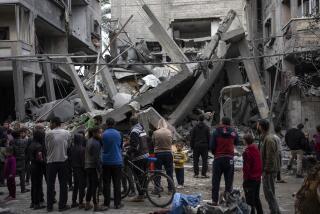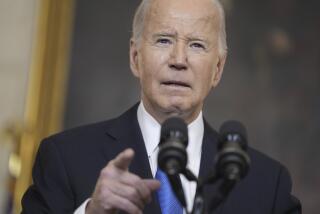Pressure by Dole Shelves Vote on Chemical Arms
WASHINGTON — The Clinton administration shelved its bid to win Senate ratification of a chemical weapons treaty Thursday after Republican presidential candidate Bob Dole set in motion an eleventh-hour groundswell of opposition that threatened to send the measure to defeat.
At President Clinton’s request, Senate Majority Leader Trent Lott (R-Miss.) pulled the item from the Senate floor before it could be put to a vote. Strategists said that the White House would try to resubmit it before the election but may have to wait until next year.
The unexpected withdrawal was an embarrassment for the president, whose administration had expected earlier this year that the treaty would easily win ratification.
Clinton and Vice President Al Gore had personally telephoned crucial senators over the last few days to try to shore up support. The Senate began debate on the measure Thursday morning, but by midafternoon the floor action was all over.
The pact had been gradually losing support even before Thursday. By this week, opponents had mustered at least 25 of the 34 votes necessary to block endorsement. The Constitution requires approval of two-thirds of the Senate--or 67 senators--to ratify a treaty.
On Wednesday night, Dole sent a letter to Republican senators saying he had serious problems with the treaty. The move set off a rush of opposition, increasing the chances that it would be defeated.
In his letter, the Republican presidential candidate said the Senate should insist that the treaty “recognize and safeguard American constitutional protections against unwarranted searches.”
Republicans have been divided over the pact, which was signed by President Bush. It has received strong support from the nation’s major chemical companies, who argued that if the U.S. did not join the new regulatory system set up by the treaty, American chemical export sales--worth about $60 billion annually--would be endangered.
But Dole and other opponents had questioned whether the pact would be effective because the countries whose chemical weapons programs pose some of the biggest threats to U.S. interests--North Korea, Libya, Syria and Iraq--have not even signed on to the treaty.
Opponents also voiced doubts that it would be possible to verify compliance, because many of the most lethal chemical weapons can be manufactured in makeshift laboratories unlikely to be detected by United Nations inspectors. And they argued that the inspections called for under the treaty would be a heavy burden for smaller chemical manufacturers.
The action prompted a bitter rejoinder from Clinton campaign headquarters. James Rubin, the campaign’s foreign policy spokesman, strongly criticized Dole for a “failure of leadership” in rallying opposition against the weapons pact. He called the action “a tragedy.”
It is unclear if the White House can push the measure through before the election, but officials conceded privately that the administration probably will have to wait for the new Congress before trying again.
However, a senior administration official said that allowing the Senate to reject the treaty formally would have been even worse for U.S. prestige. “The president reached a judgment that we could not risk” the vote and he stopped the floor action, the official said.
The treaty, which has been ratified by 63 countries, now appears likely to go into force without American participation. Only two more countries among the 160 that have signed the treaty need to ratify it for it to take effect.
If that happens without U.S. ratification, the United States would not be a part of the planning or implementation of the international inspection system, which is designed to ensure that prohibited chemicals are not being manufactured.
Considered a landmark by arms-control advocates, the treaty would oblige the United States and other signatories to eliminate all their chemical weapons within 10 years and shut down any facilities that could be used for developing or manufacturing them.
The ban would be enforced by a new U. N. agency that would be empowered to inspect suspected chemical weapons sites and factories at will--even those firms that are only peripherally involved in chemicals production--and demand prosecution of any violators.
More to Read
Get the L.A. Times Politics newsletter
Deeply reported insights into legislation, politics and policy from Sacramento, Washington and beyond. In your inbox three times per week.
You may occasionally receive promotional content from the Los Angeles Times.










